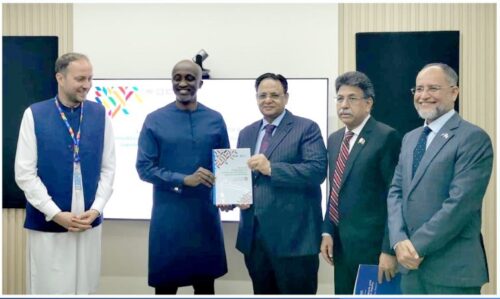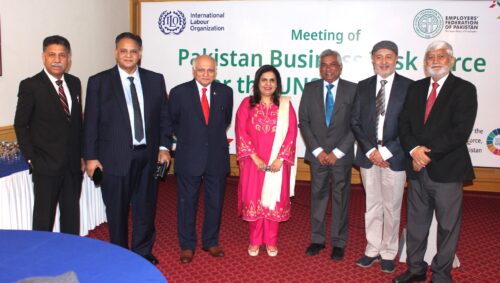About PBTF

The Pakistan Business Task Force (PBTF), an initiative of the Employers’ Federation of Pakistan (EFP), emerged as a pivotal initiative geared towards enhancing the private sector involvement in Pakistan’s United Nations Sustainable Development Cooperation Framework (UNSDCF) implementation process This strategic undertaking aims to enhance direct engagement with the office of the UN Resident Coordinator (UNRC), in partnership with ILO’s ACT/EMP and the ILO Country Office for Pakistan, towards more effective contribution of the private sector in the process of UNSDCF implementation towards achievement of the Sustainable Development Goals (SDGs) in Pakistan.
When UNSDCF 2023-27 was being formalised during 2020-22, ILO Pakistan, under the directive of the UNRC, took the lead in engaging the business sector, which is playing a central role in meeting several SDGs but has no or little voice in driving the agenda of SDGs. Moreover, the private sector’s contribution goes un- or under-reported with respect to the country’s progress on SDG milestones.
The ILO helped to constitute the PBTF under the aegis of EFP with eleven founding members in April 2022. These members include: Business Associations (BAs), EFP, the Federation of Pakistan Chambers of Commerce and Industry (FPCCI), the Overseas Investors Chamber of Commerce and Industry (OICCI) and the UN Global Compact Network (UNGCN) of Pakistan. The purpose of the task-force was to establish a linkage with the UNRC and promote the contribution of the private sector towards achieving the sustainability development agenda 2030.
The UNSCDF 2023-27 for Pakistan identifies a number of challenges and barriers faced by the private sector in contributing to the SDGs. These include a lack of awareness about the SDGs, a lack of capacity to implement sustainable practices, a lack of funds and investment incentives, and policy barriers that make it difficult and expensive to invest in sustainable practices. Other challenges include short-term profit priorities, regulatory challenges, financial constraints, data accessibility issues, and a lack of expertise in sustainability reporting. Despite these challenges, a number of significant organisational best practices for private-sector SDG contributions have been identified in this Road Map.
Goal & Key Focus Area
The goal for PBTF is to encourage and enable the business community to support the UN in achieving the SDGs as envisioned in the UNSDCF for Pakistan.
To achieve this goal, we have developed a 3-year Roadmap for Engagement in UNSDCF Process and Key Entry Points for PBTF and EFP.
The PBTF is a platform that connects the private sector with the UN to advance sustainable development. We endeavour to substantially enhance private sector’s contribution to SDGs in Pakistan. The PBTF founders have laid out clear guidelines and accountability mechanisms to ensure its effectiveness in leading this partnership.

Core Functions
The PBTF advises the Government on how to support sustainable development and engage the private sector in the SDGs. The PBTF organises dialogues and cooperation between the Government, private sector and the UN, and arranges events and activities to enhance knowledge exchange and joint projects.
The PBTF mobilises the private sector to invest in sustainable development, by raising awareness of the SDGs among businesses, encouraging sustainable business practices, and fostering public-private partnerships.
The PBTF translates the SDGs into Environment, Social and Governance (ESG) standards and promotes them among the private sector and its members in general and the small and medium enterprises (SMEs) in particular by making the ESG standards easy-to-implement for the SME sector, the backbone of economy and employment in Pakistan.
The PBTF tracks and reports on the private sector’s impact on the SDGs, gathering data on investments, jobs, workers’ rights, employment of women and the disadvantaged, and sustainability, and highlighting challenges faced by the private sector in their efforts to contribute to SDGs in Pakistan.
- For more details, please see our Roadmap for Business Engagement in the UNSDCF Process, Key Entry Points for PBTF.
- PBTF was officially launched on 24th January 2024.
Resources
- Study on the Private Sector’s Contribution to SDGs in Pakistan: This study marks a pioneering effort in Pakistan, shedding light on the private sector’s contributions to the SDGs in terms of the current state of awareness, practices and reporting prevalent within the private sector. This research brings to light current trends and challenges in private sector’s contribution to SDGs in Pakistan; it also informed PBTF’s Strategic Roadmap for engagement on UNSDCF process in Pakistan with the overarching goal of assisting the United Nations in achieving the SDGs in Pakistan.
- Case Studies on Private Sector’s Contribution to SDGs in Pakistan.
- Case Study 1: Lucky Care Centre Creates Decent Workplace for Factory Workers
- Case Study 2: The Light of Empowerment: K-Electric’s Roshni Baji Programme
- Case Study 3: Hub Salt Pioneers Zero Liquid Discharge in Pakistan
- Case Study 4: The Art of Recycling for Sustainability by Artistic Fabric Mills


